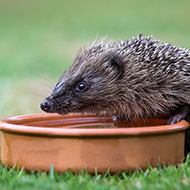
Manufacturer produces guide for veterinary surgeons
Macahl Animal Health, the manufacturer of Oralade, has issued a statement emphasising the importance of assessing the hydration status of wild species admitted to veterinary practices.
The winter months often bring with them an increase in admissions of hibernating species. Macahl Animal Health predicts that there may be a greater rise in wildlife patients being brought into veterinary practices and sanctuaries this year, as people will spend more time outside due to COVID-19 restrictions.
Anthony Mackle, from Oralade, Macahl Animal Health, said: “British hedgehogs are now classified as vulnerable to extinction, so we have been working with wildlife centres to help with the recovery of their rescue hogs, particularly those with dehydration or inappetence. This is a project we are really passionate about, and we are delighted that our donations of Oralade GI Support have been making a difference.”
Macahl Animal Health regularly donates Oralade to wildlife centres, to help a variety of species that are suffering from dehydration and are reluctant to eat.
Identifying dehydration is a similar process for wildlife as it is for pet species, and includes assessment of skin tent, gum colour, and capillary refill time. Macahl Animal Health suggests that if there is any uncertainty about a hedgehog's hydration status, it is best to assume a degree of dehydration.
The company has provided a guide on hedgehog hydration for veterinary professionals here.
A representative from Oak and Furrows Wildlife Rescue Centre, Wiltshire commented: “We were recommended Oralade GI by another wildlife rescue centre as sometimes we would have hedgehogs refusing to eat. We tried Oralade, and also mixed a little in with some food and even the persistent non-eaters gave it a try. This certainly seems to be far more palatable to our hogs than regular rehydration fluid.”



 The Veterinary Medicines Directorate (VMD) is inviting applications from veterinary students to attend a one-week extramural studies (EMS) placement in July 2026.
The Veterinary Medicines Directorate (VMD) is inviting applications from veterinary students to attend a one-week extramural studies (EMS) placement in July 2026.